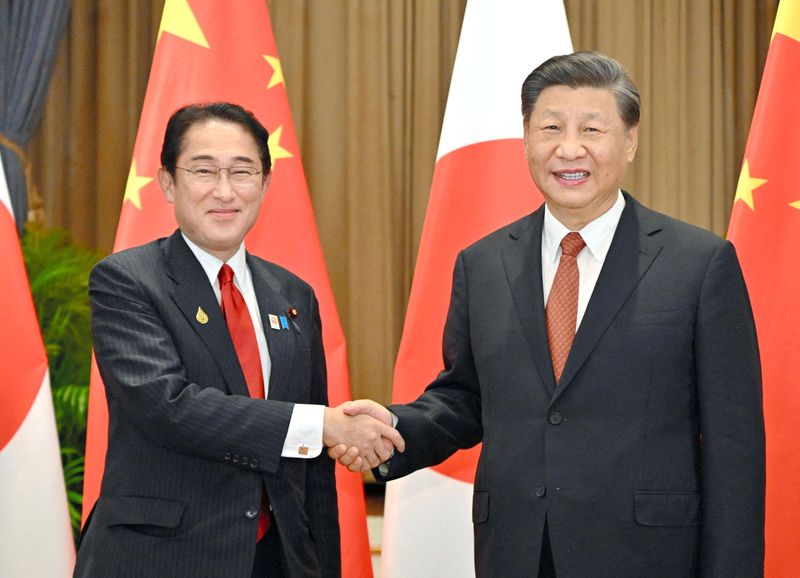By Yukiko Toyoda, Kiyoshi Takenaka and Laurie Chen
TOKYO/BEIJING (Reuters) -If Japanese Prime Minister Fumio Kishida meets Chinese President Xi Jinping for the first time in a year later this week, he will likely raise the case of a detained company executive that has dealt an outsized blow to their close economic ties.
The employee of drugmaker Astellas Pharma, as well as other Japanese imprisoned or under criminal probes in China, would probably be among the topics to be discussed as plans take shape for the leaders to talk on the sidelines of the APEC summit in San Francisco, sources familiar with the planning said.
The arrest of the well-connected veteran of the Japanese community in China has had what some Tokyo officials described as a considerable chilling effect on business, contributing to a drop in foreign investment to its lowest level since at least 2014 and accelerating an exodus of expats.
"I know Japanese businesses are rethinking," Rahm Emanuel, the U.S. ambassador to Japan, told Reuters in an interview. "Right now, you can't get people to go staff the companies in China because they're scared of their own safety."
China detained the executive, named in several media reports as Hiroshi Nishiyama, on suspicion of espionage in March, and he was formally arrested last month. Japan's then foreign minister protested the executive's detention with his Chinese counterpart on a visit to Beijing in April.
There has been no official confirmation that Kishida and Xi will hold a meeting, which some Japanese news outlets have said is being prepared for Thursday.
A spokesperson for Japan's foreign ministry said in an emailed statement that Tokyo had repeatedly urged Beijing at various levels to repatriate Japanese nationals detained in China and to ensure transparency in the judicial process.
"Although nothing has been decided on future Japan-China bilateral summit meetings, including on the occasion of the APEC summit meeting to be held this week, we will continue to urge the Chinese side to do so," Masashi Mizobuchi, assistant press secretary at the ministry, said.
China's foreign ministry said in a statement: "China has always supported China-Japan trade and economic cooperation, and provides a good environment for the lawful operation of Japanese companies in China and their employees."
RISKY BUSINESS
Five Japanese nationals are currently detained in China with a total of 17 detained since 2015, the year after China's anti-espionage law went into effect, according to Japan's foreign ministry.
But the arrest of Nishiyama hit a nerve partly because of the timing - coming during a sweeping national security crackdown and because of the executive's high profile.
Nishiyama, a fluent Mandarin speaker and former board member of the Japanese Chamber of Commerce in China, attended several high-profile events with officials from both countries in recent years.
He often spoke about his connections to officialdom, two people who knew him said on condition of anonymity.
Because of Nishiyama's status, his arrest had symbolic importance, according to five Japanese government officials, who also spoke on condition of anonymity due to the sensitivity of the case.
The officials said that since his detention there has been a sharp uptick in questions from business people asking if it is safe to travel to China, while some Japanese companies in China have been telling employees to keep a low profile and not push too hard in sales and other activities.
"People are worried that they may be arrested suddenly when they go to China," Takeshi Niinami, chairman of the Japan Association of Corporate Executives, told a news conference last month.
"Considering the current situation in China, it is very difficult to create an atmosphere that encourages people to do something new," said Niinami, who is also the CEO of drinks giant Suntory.
DIFFICULT DECISIONS
In the first nine months of this year, Japan's net foreign direct investment (FDI) into mainland China slumped 30.6% on the year to 393.4 billion yen ($2.6 billion), even as its total worldwide FDI grew by nearly a fifth, according to ministry of finance data.
That is the lowest amount for the period going back to at least 2014 when the data series begins.
Half the respondents in a recent survey of Japanese companies doing business in China said they would cut investments this year. Only 10% of the 8,300 firms said they would increase investments, according to the inaugural poll by the Japanese Chamber of Commerce in China published last month.
The reasons for caution given by respondents included sluggish demand, cross border regulation and "concerns about the risk of investment in China at head office".
Alongside the U.S., China is Japan's biggest trade partner, and a major unwind of that relationship is not on the immediate horizon, economists say.
But finding Japanese to staff offices in China could become more of a problem for Japanese firms.
The number of Japanese living in China has been on a steady decline over the last decade and totalled 102,066 in 2022, according to data collected by Japan's foreign ministry. A similar drop this year would mark the lowest number of expats there since at least 2004.
A real estate agent in Beijing, speaking on condition of anonymity, said the Astellas case had a "huge impact" on his Japanese clients with people refusing assignments in China or their families opposing the moves because they are "scared" about getting in legal trouble.
Stefan Angrick, a senior economist for Moody's Analytics based in Tokyo, said even some of the most pro-China business executives in Japan are now wary of security risks there.
"Japan and China are two economies that are deeply intertwined with one another and are incredibly important for one another. It's a very difficult point in time to be navigating that as a decision maker, in business or politics," he said.
($1 = 151.7200 yen)
